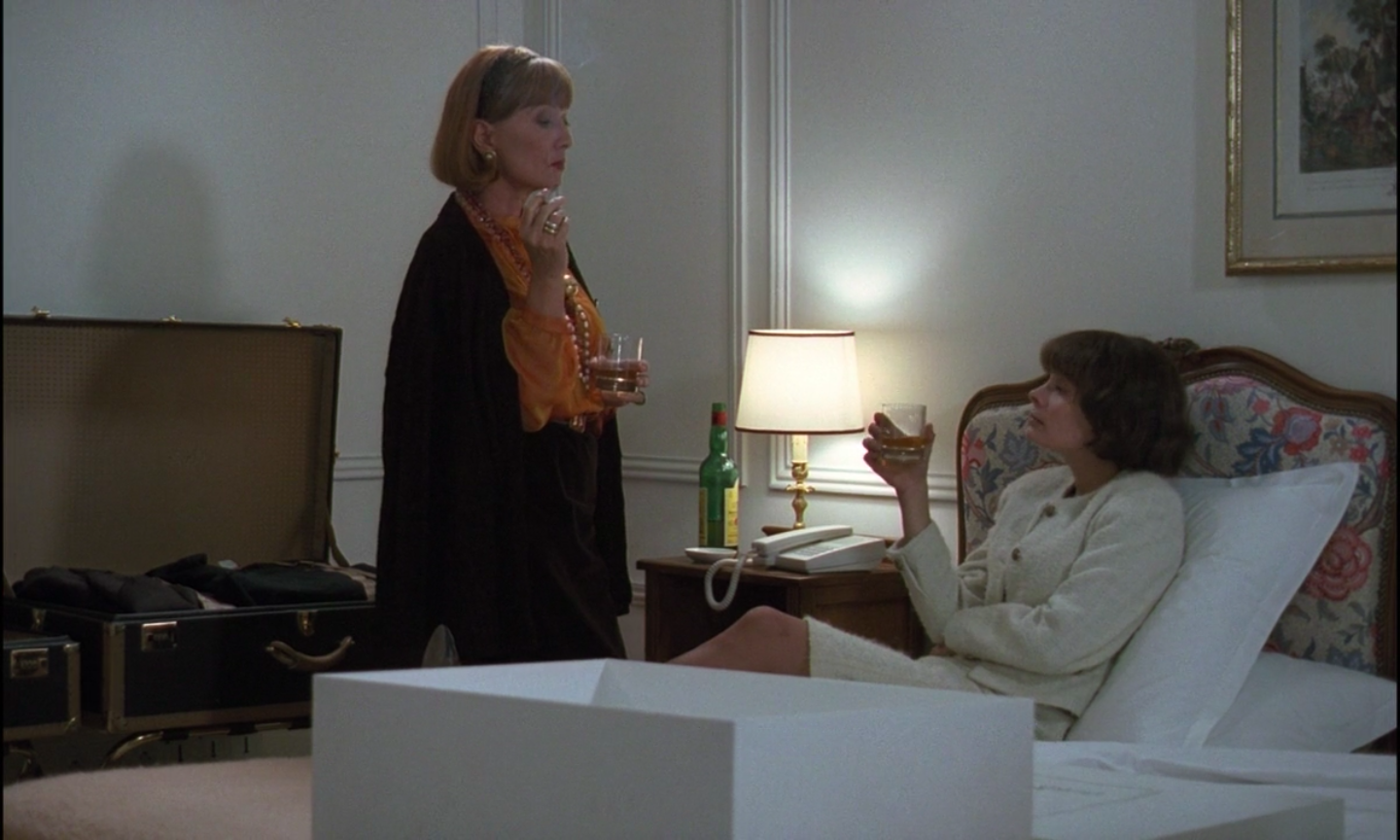by Patrick Preziosi
Marie Trintignant retains a few performative constants as the ground shifts below her feet as the title character in Claude Chabrol’s Betty (1992): a stare that vacillates between the suggestively dim and the piercing, an insatiable whiskey habit, rampant chain smoking, a visage that appears as if it’ll crack into surrender at any given moment, and a Chanel suit as uniform. Barred from seeing her children by her husband’s odiously bourgeois family after caught in flagrante delicto with another man by him and his mother, Betty (née Elizabeth Etamble) embarks on an all-night odyssey before bottoming out in the care of the older Laure (Stéphane Audran) in a lavish Versailles hotel.
Betty stands as the apex of the actress’ too-short career, a project independent of her parents Jean-Louis and Nadine, who were mostly present in her work up until her first outing with Chabrol, as the prostitute Lulu in 1988’s Story of Women. Trintignant is left much ground to cover in this followup collaboration, juggling lengthy, booze-soaked monologues with sudden reminiscences that flit in and out of focus as if she were undergoing the same traumatic process as the protagonist of Alain Resnais’ time-traveling panoply of memory, Je t’aime, Je t’aime (1968). It’s a performance that hinges on the self-possession of the one delivering it, and Trintignant embeds herself entirely, perhaps disconcertingly so.
Chabrol subtly mounts an achronological structuring, an early example of his late style crystallization, the graceful jaggedness of his earlier work evolving into pure, unencumbered fluidity. Betty’s first dispatch from the past is brief enough to assume the film will be a largely present-tense work, but by the halfway mark these memories begin to invade more and more––some reaching as far back as childhood––evincing a closed-circuit memory loop, as the audience remains firmly aware of the destination, the inevitable lead up to the precise point where the film began, with a day drunk Trintignant stumbling between bars. The actress is practically denied the fallback of a schematic performance, shifts in time visibly denoted by changes in hair and the declining state of the aforementioned Chanel suit, as Trintignant herself subtly modulates her own mannerisms for each scenario. To avoid the perpetually distrusting eye of her husband’s family, she drinks exclusively in private, sneaking swigs under the pretense of making a phone call in the next room; when not cloistered by expectations of propriety, Trintignant unabashedly indulges this appetite, that although seemingly couched in a streak of self-destruction, still imparts a secondhand sensation of reclaimed agency.
Trintignant elevates Betty above all the men she encounters, more willing to withhold than to get histrionical, presenting a palpable desire for independence that circumvents the illusory by never verbalizing such an aspiration. Betty recounts mostly in a straightforward manner, and it’s in the delivery that the emotion is unveiled: the first lengthy memory-trip is narrated as she moves back and forth across her hotel room, drinking and unpacking, before the accumulated pain is too much to bear, and she ends her monologue tearfully balled up in the corner. That doesn’t mean she won’t occasionally swing back (her insufferable, dermatologist-in-training paramour is the recipient of such pushback, as he is all too willing to analyze and wax philosophically about Betty), but there’s the double bind fomented by ostensibly comfortable living, that it can all be yanked from her upon the most minute misstep. Most tragically, when her children are born, they’re whisked away into the care of a live-in nurse, and Betty is mother in name only, viewed more as the supplier of a bourgeois progeny than anything.
The daughter of a working class provincial family, every setting is made liminal to Betty because of her upbringing, the chasm between her and her husband yawning even more when she moves into the well-appointed family home. Trintignant shrinks into herself, embodying claustrophobia even in the face of such furnished roominess. There’s then Le Trou, the bar where Betty meets Laure, which is limned with such subtle surrealism––sinister patrons, army fatigue bedecked elderly men, collective stares at unfamiliar faces––that it’s comparable to any of Rainer Werner Fassbinder’s oneiric watering holes. Trintignant enacts her character’s vices with a shaky intensity, that endless parade of cigarettes and drinks the only thing standing between her and the onlookers.
It’s hard not to think of Trintignant’s own untimely death while watching Betty, given its hotel setting, and the way it ratchets up the tension at key moments, as if to suggest a violent, external rupture through its manicured, bourgeois spaces. But the performance at the center remains coiled, majestically so; Betty tests the limits of her resolve, but there’s an implicit self-trust, never intimating a total lack of control. It’s a quality embodied by all Chabrol actors, Audran and Isabelle Huppert especially, and between Betty and Story of Women, Trintignant ably inserts herself, rounding out this informal trio. Trintignant unfortunately didn’t have the opportunity to surpass what she’d achieved in Betty, but her performance, both guarded and vulnerable, endures.



One thought on “Betty and Marie”